Educating Bartenders Worldwide.
By Beverage Trade Network
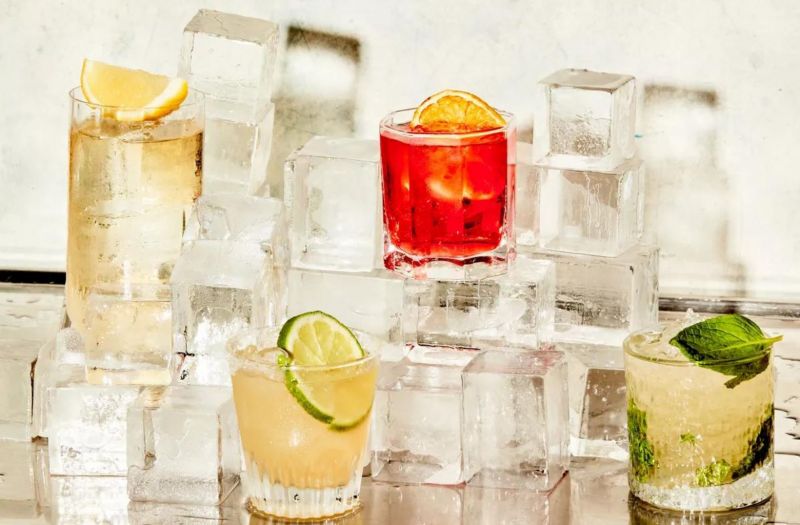
In the world of mixology, ice is often an underrated ingredient. While spirits, mixers, and garnishes typically receive the spotlight, ice plays a crucial role in the crafting of cocktails. Its influence extends beyond merely chilling a drink, ice affects the dilution, texture, and overall balance of a cocktail. For professional bartenders and home enthusiasts, understanding the art of ice is fundamental to elevating the cocktail experience. This article explores the selection, preparation, and serving of ice, delving into the nuances that can transform a good drink into an exceptional one.
Ice is more than frozen water, it is a tool that can enhance or diminish the quality of a cocktail. The primary functions of ice in cocktails include chilling the drink, controlling dilution, and contributing to the presentation. Each of these functions requires careful consideration of the type of ice used and how it is handled.
Chilling the Drink: The primary role of ice is to cool the beverage. Properly chilled cocktails are refreshing and invigorating, while inadequately chilled drinks can be unpleasant. The temperature of a cocktail directly affects the taste experience, as certain flavors become more pronounced at different temperatures.
Controlling Dilution: As ice melts, it dilutes the cocktail, which can be both beneficial and detrimental. Proper dilution helps integrate the flavors of the ingredients, creating a harmonious blend. However, excessive dilution can weaken the drink, leading to a watered-down taste. The key is to strike the right balance, which hinges on selecting the appropriate ice and understanding its melting properties.
Enhancing Presentation: Ice also plays a vital role in the visual appeal of a cocktail. Clear, well-shaped ice can make a drink look more enticing, while cloudy or misshapen ice can detract from its appearance. In high-end bars, ice is often considered part of the presentation, contributing to the overall aesthetic and experience.
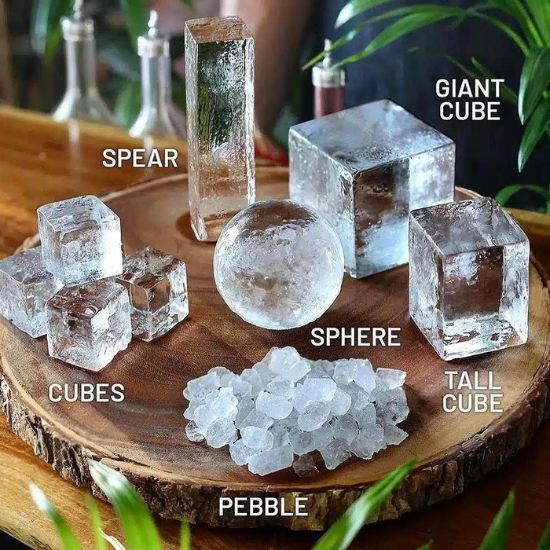
Source: Cocktail Society
Different cocktails require different types of ice to achieve the desired effect. The most common types of ice used in mixology include cubes, crushed ice, spheres, and specialty shapes. Each type serves a specific purpose and has unique characteristics.
Standard ice cubes are versatile and widely used in various cocktails. They are typically 1 inch in size and provide a good balance of chilling and slow dilution. Ice cubes are suitable for drinks that need moderate chilling and controlled dilution, such as an Old Fashioned or a Negroni.
Crushed ice has a much larger surface area than cubes, causing it to melt faster and chill drinks more rapidly. It is ideal for cocktails that benefit from quick chilling and significant dilution, such as a Mint Julep or a Mai Tai. The texture of crushed ice also adds a tactile element to the drinking experience.
Ice spheres are large, round pieces of ice that melt slowly due to their minimal surface area relative to volume. They are perfect for drinks that require prolonged chilling with minimal dilution, such as a Whiskey on the Rocks. Ice spheres also add a sophisticated touch to the presentation.
Specialty ice shapes, such as diamonds, rods, or custom molds, are often used for their aesthetic appeal. These types of ice can enhance the visual impact of a cocktail, making them popular in high-end bars and for special occasions. While their melting properties vary, they are typically chosen for their unique appearance.
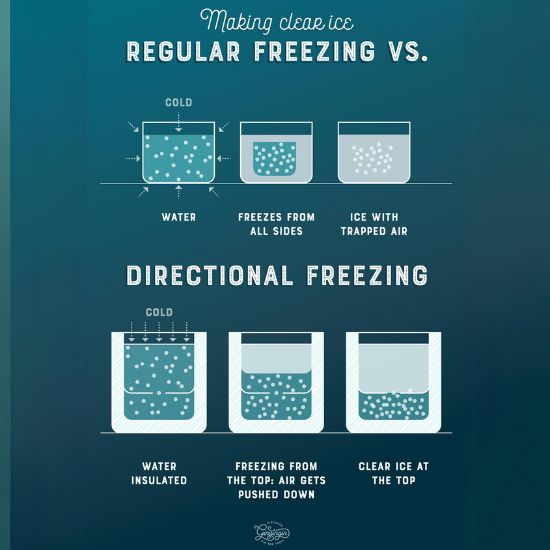
Source: Liquor Labs
The quality of ice can significantly affect the final product. Therefore, proper preparation is essential. This involves ensuring the ice is clean, clear, and appropriately shaped for its intended use.
Making Clear Ice: Clear ice is a mark of quality in cocktails. It is free of impurities and air bubbles, which can affect both the taste and appearance of the drink. To make clear ice, start with purified or distilled water. Boil the water to remove dissolved gases and let it cool. Freeze the water in a well-insulated container to ensure slow freezing, which encourages the formation of clear ice. Another method is to use a directional freezing technique, which involves freezing the water from one direction, usually top to bottom, to push impurities to the bottom.
Shaping Ice: Shaping ice involves cutting or molding it into the desired form. For standard cubes and crushed ice, ice trays and crushers are commonly used. For specialty shapes, silicone molds are available in various designs. For ice spheres, specific molds or press devices can create perfectly round ice. Properly shaped ice not only looks better but also performs its intended function more effectively.
Storing Ice: Once ice is prepared, it needs to be stored correctly to maintain its quality. Store ice in an airtight container in the freezer to prevent it from absorbing odors. Avoid using plastic bags, as they can impart unwanted flavors. For large batches, an ice bin with a lid works well. Ensure the ice is used promptly to prevent it from becoming cloudy or absorbing flavors from the freezer.
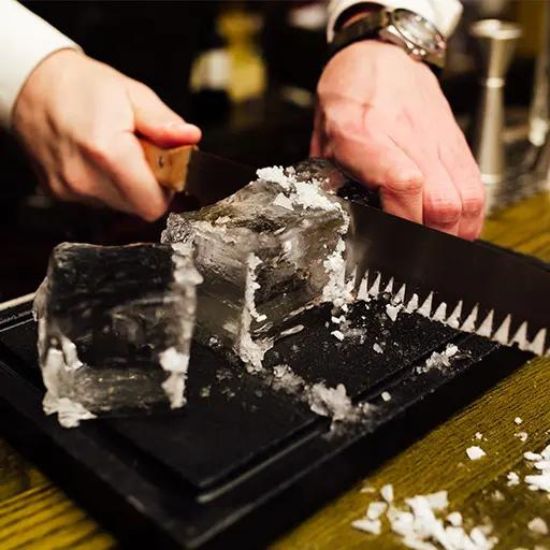
Source: Diageo Bar Academy
The way ice is served can impact the drink's final presentation and taste. Proper handling and serving techniques ensure that ice contributes positively to the cocktail experience.
Handling Ice: When handling ice, cleanliness is really important. Always use clean hands or utensils to transfer ice from the storage container to the glass. Avoid touching ice directly with your hands to prevent contamination. Use tongs or an ice scoop for hygienic handling.
Serving Techniques: Different cocktails require different serving techniques when it comes to ice. For shaken cocktails, fill the shaker with ice and shake vigorously to achieve proper chilling and dilution. For stirred cocktails, stir the ingredients with ice in a mixing glass until well chilled, then strain into the serving glass with fresh ice. For drinks served over ice, such as a Gin and Tonic, fill the glass with ice before adding the other ingredients to ensure even chilling.
Presentation: Presentation is a key aspect of serving cocktails. Use clear, well-shaped ice to enhance the visual appeal. For drinks that showcase the ice, such as a whisky on the rocks, use a large, clear ice sphere or cube. For highball cocktails, use long, clear ice rods that fill the glass. Garnish the drink attractively to complement the ice and the cocktail's overall look.
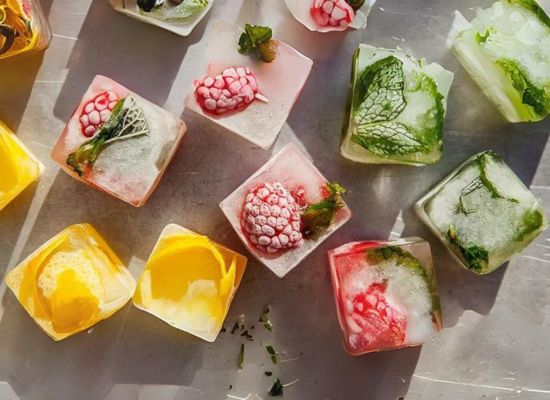
Source: Tasting Table
In recent years, bartenders have begun to experiment with ice to create innovative and memorable cocktail experiences. These techniques include flavored ice, ice infusions, ice sculptures, and much more.
Flavored ice adds an extra layer of complexity to cocktails. By freezing ingredients such as fruit juices, herbs, or spices into the ice, bartenders can introduce new flavors as the ice melts. This technique is particularly effective for enhancing simple cocktails, adding a dynamic flavor progression as the drink is consumed.
Ice infusions involve freezing ingredients within the ice itself. This can include herbs, flowers, or even small fruits. As the ice melts, these ingredients infuse the drink with subtle flavors and aromas. Ice infusions are a creative way to add depth to cocktails and can be customized to complement the drink's profile.
Ice sculptures are an extravagant way to present cocktails, often used for special events or high-end bars. Sculptures can range from simple designs to intricate works of art. They not only chill the drink but also serve as a stunning visual centerpiece. While they require more effort and skill to create, ice sculptures elevate the cocktail experience to an art form.
The art of ice is a vital component of mixology that can significantly impact the quality and enjoyment of cocktails. From selecting the right type of ice to mastering preparation and serving techniques, understanding the nuances of ice allows bartenders to create exceptional drinks. Whether it's achieving the perfect balance of chilling and dilution, enhancing the presentation, or experimenting with innovative uses, ice is a versatile and essential element in the craft of cocktail making. By paying attention to the details of ice, both professional bartenders and home enthusiasts can elevate their cocktail creations to new heights, ensuring every drink is a memorable experience.
Header Image Source: Dan Murphy’s